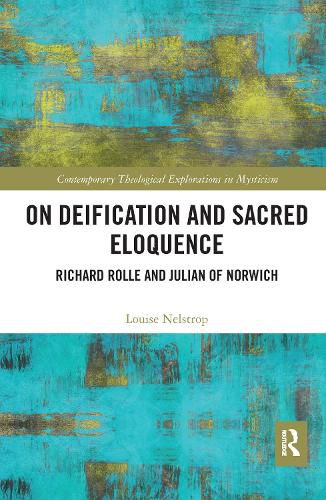Readings Newsletter
Become a Readings Member to make your shopping experience even easier.
Sign in or sign up for free!
You’re not far away from qualifying for FREE standard shipping within Australia
You’ve qualified for FREE standard shipping within Australia
The cart is loading…






This book considers the place of deification in the writings of Julian of Norwich and Richard Rolle, two of the fourteenth-century English Mystics. It argues that, as a consequence of a belief in deification, both produce writing that is helpfully viewed as sacred eloquence.
The book begins by discussing the nature of deification, employing Norman Russell’s typology. It explores the realistic and ethical approaches found in the writings of several Early Greek Fathers, including Irenaeus of Lyons, Cyril of Alexandria, Origen, and Evagrius Ponticus, as well as engaging with the debate around whether deification is a theological idea found in the West across its history. The book then turns its attention to Julian and Rolle, arguing that both promote forms of deification: Rolle offering a primarily ethical approach, while Julian’s approach is more realistic. Finally, the book addresses the issue of sacred eloquence, arguing that both Rolle and Julian, in some sense, view their words as divinely inspired in ways that demand an exegetical response that is para-biblical.
Offering an important perspective on a previously understudied area of mysticism and deification, this book will be of interest to scholars of mysticism, theology, and Middle English religious literature.
$9.00 standard shipping within Australia
FREE standard shipping within Australia for orders over $100.00
Express & International shipping calculated at checkout
This book considers the place of deification in the writings of Julian of Norwich and Richard Rolle, two of the fourteenth-century English Mystics. It argues that, as a consequence of a belief in deification, both produce writing that is helpfully viewed as sacred eloquence.
The book begins by discussing the nature of deification, employing Norman Russell’s typology. It explores the realistic and ethical approaches found in the writings of several Early Greek Fathers, including Irenaeus of Lyons, Cyril of Alexandria, Origen, and Evagrius Ponticus, as well as engaging with the debate around whether deification is a theological idea found in the West across its history. The book then turns its attention to Julian and Rolle, arguing that both promote forms of deification: Rolle offering a primarily ethical approach, while Julian’s approach is more realistic. Finally, the book addresses the issue of sacred eloquence, arguing that both Rolle and Julian, in some sense, view their words as divinely inspired in ways that demand an exegetical response that is para-biblical.
Offering an important perspective on a previously understudied area of mysticism and deification, this book will be of interest to scholars of mysticism, theology, and Middle English religious literature.